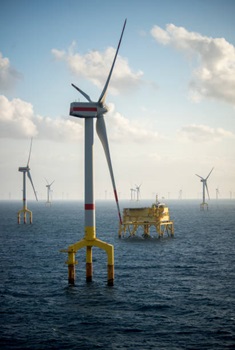How much will marine reserves be affected by increased ocean noise?
Oregon legislature passed
HB 4132 (2024), which is designed to protect marine life along Oregon’s coast. This bill focuses on Oregon’s
five marine reserves, which are coastal waters dedicated to scientific research and conservation. HB 4132 requires the state to outline ways to continue protecting these coastal waters from developments and other threats to marine life. It provides the Oregon Department of Fish and Wildlife with funding to do this work.
For relatively low cost ($1 million/biennium), HB 4132 provides support to build a state-of-the-art Marine Reserves Program. It will allow more robust monitoring, adaptive management, and ocean resiliency in the face of a changing climate to support biodiversity and our economically important fisheries.
A "marine reserve" defines an area within coastal waters dedicated to scientific research and conservation, where ocean development and removal of marine life is prohibited. A "marine protected area" refers to coastal waters directly next to a marine reserve, which have site-specific rules that allow some fishing activities while prohibiting development. Oregon currently has five marine reserves that have been officially designated for ocean areas along the coast. These marine reserves are managed by the Oregon Department of Fish and Wildlife, which handles planning and oversight of scientific research as well as monitoring within the reserves.
The five established marine reserves are:
- Cape Falcon - Established in 2016, the Cape Falcon Marine Reserve is the northernmost reserve, just off of Oswald West State Park, near Manzanita. This site includes a marine reserve plus two Marine Protected Areas.
- Cascade Head - The Cascade Head Marine Reserve is located off the central Oregon coast, stretching between the Cascade Head headland and Lincoln City. The site includes a marine reserve surrounded by three Marine Protected Areas and was established in 2014.
- Cape Perpetua - Oregon’s largest marine reserve is the Cape Perpetua Marine Reserve, established in 2014 between Yachats and Florence on the central Oregon coast. This area comprises a marine reserve, two Marine Protected Areas, and a Seabird Protection Area.
- Otter Rock - The Otter Rock Marine Reserve is on the central Oregon coast, near the unincorporated town of Otter Rock. As Oregon’s smallest marine reserve, it spans 1.2 square miles and was established in 2012.
- Redfish Rocks - The Redfish Rocks Marine Reserve, established in 2012, is positioned between Rocky Point and Coal Point, just south of Port Orford. This area includes a Marine Protected Area to the west.
It isn't without opponents claiming the plan “will shut down poor people’s access to natural sustainable fishing. This has nothing to do with helping the ecology, it’s simply a communistic shut down of access to food.” They further object to when “Jimmy Carter changed the laws so the Japanese and Chinese can come into USA waters and take as many Salmon as they want and government continues to tax us to death for Salmon Enhancement.”
The open question is the effect of the noise from ocean windmill farms on ecosystems and marine life. From the book,
Ocean Noise and Marine Mammals, “When underwater objects vibrate, they create sound-pressure waves that can disturb the natural behavior and habitats of marine animals.”
Some of the effects on marine life includes:
- Loud sound waves can cause internal injuries in fish and, in the long term, physical malformations and increased infertility.
- Shrimp and mussels are also affected, with growth disturbances, reduced fertility, and associated low reproduction rates.
- Animals may flee their habitats, stopping their hunt for food and using up their reserves, which can have cascading effects on entire populations.
A D V E R T I S E M E N T

A D V E R T I S E M E N T
The speed of sound in water is faster than air and travels significantly farther, allowing them to travel thousands of miles at 1,500 meters per second. They may vary with water temperature, salinity, and the source of the sound frequency.
The dominant physical mechanisms of naturally occurring sound in the ocean occur at or near the ocean surface. Most are associated with wind fields acting on the surface and the resulting surface wave activity. Even offshore wind farms have a big impact on underwater pollution. From their construction to their deployment, offshore wind farms, with their turbines and metallic foundations, generate noise and vibrations below the sea surface (called “anthropogenic noise” because it is unnatural and human-made) that disturb marine life and flora, especially for the underwater mammals that rely on sound (like echolocation or vocalization) to survive in the ocean. The impacts of underwater noise pollution on marine life can vary from species to species and long-term effects are yet to be confirmed.
Ocean windmill farms underwater power cables carry the renewable energy from the offshore wind farms to the mainland grid emit electromagnetic fields (EMFs.) These artificial magnetic fields can interfere with, and even mask, the natural EMFs present in the ocean.
Established daily ocean activity has more than doubled in 25 years increasing 0.55 dB per year. This increase was attributed to commercial shipping, namely a doubling of the number of ships. Noise measurements was also made on a receiver on the continental slope of Point Sur, California, that caused and increased noise from 100 to 400 Hz that they have no satisfactory explanation for.
Ocean noise is increasing and potentially five-times due to climate change. Climate change will create areas with amplified noise levels from human-generated noise, such as windmills. These hotspots could impact essential activities of marine life.
--Donna Bleiler| Post Date: 2024-07-26 08:33:00 | Last Update: 2024-07-27 18:18:59 |







